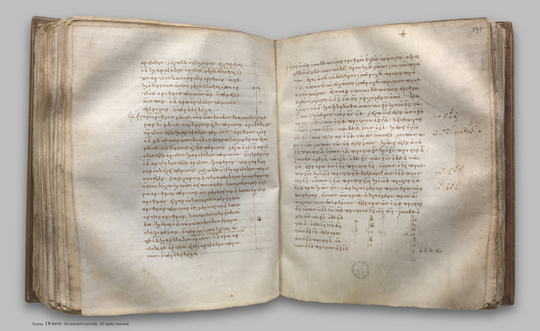index prev next | digilib folio 179

If a number neither be one of those which are continually doubled from a dyad, nor have its half odd, it is both eventimes even and even-times odd.
| Ἐὰν ἀριθμὸς μήτε τῶν ἀπὸ δυάδος διπλασιαζομένων ᾖ μήτε τὸν ἥμισυν ἔχῃ περισσόν, ἀρτιάκις τε ἄρτιός ἐστι καὶ ἀρτιάκις περισσός. Ἀριθμὸς γὰρ ὁ Α μήτε τῶν ἀπὸ δυάδος διπλασιαζομένων ἔστω μήτε τὸν ἥμισυν ἐχέτω περισσόν: λέγω, ὅτι ὁ Α ἀρτιάκις τέ ἐστιν ἄρτιος καὶ ἀρτιάκις περισσός. Ὅτι μὲν οὖν ὁ Α ἀρτιάκις ἐστὶν ἄρτιος, φανερόν: τὸν γὰρ ἥμισυν οὐκ ἔχει περισσόν. λέγω δή, ὅτι καὶ ἀρτιάκις περισσός ἐστιν. ἐὰν γὰρ τὸν Α τέμνωμεν δίχα καὶ τὸν ἥμισυν αὐτοῦ δίχα καὶ τοῦτο ἀεὶ ποιῶμεν, καταντήσομεν εἴς τινα ἀριθμὸν περισσόν, ὃς μετρήσει τὸν Α κατὰ ἄρτιον ἀριθμόν. εἰ γὰρ οὔ, καταντήσομεν εἰς δυάδα, καὶ ἔσται ὁ Α τῶν ἀπὸ δυάδος διπλασιαζομένων: ὅπερ οὐχ ὑπόκειται. ὥστε ὁ Α ἀρτιάκις περισσός ἐστιν. ἐδείχθη δὲ καὶ ἀρτιάκις ἄρτιος. ὁ Α ἄρα ἀρτιάκις τε ἄρτιός ἐστι καὶ ἀρτιάκις περισσός: ὅπερ ἔδει δεῖξαι. | If a number neither be one of those which are continually doubled from a dyad, nor have its half odd, it is both eventimes even and even-times odd. For let the number A neither be one of those doubled from a dyad, nor have its half odd; I say that A is both even-times even and even-times odd. Now that A is even-times even is manifest; for it has not its half odd. [VII. Def. 8] I say next that it is also even-times odd. For, if we bisect A, then bisect its half, and do this continually, we shall come upon some odd number which will measure A according to an even number. For, if not, we shall come upon a dyad, and A will be among those which are doubled from a dyad: which is contrary to the hypothesis. Thus A is even-times odd. But it was also proved even-times even. |